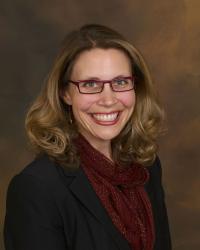Melanie Ross ‘04 M.A.R., ‘07 M.Div., assistant professor of liturgical studies, is also a kind of translator, an interpreter between two Christian worlds: the evangelical and the mainline.

“Thinking in dichotomies is a way to make sense of the landscape—low vs. high, urban vs. rural, left vs. right, us vs. them—yet that’s a distortion,” she says.
“Most congregations live somewhere in the middle between the extremes. There’s a need for a ‘hermeneutic of charity’ today in discussions between evangelical and liturgical churches.”
Ross observes the landscape from a distinctive point of view. She is an evangelical Protestant who is fluent in the history of non-evangelical liturgy. Her upcoming book, Evangelical vs. Liturgical? Defying a Dichotomy (Eerdmans, 2014) addresses some outdated misunderstandings she sees between the two traditions and challenges the simple dichotomies scholars have used to distinguish between them.
The book features a close examination of two evangelical churches that she visited for six months each—Eastbrook Church in Milwaukee, WI, and West Shore Evangelical Free Church in Mechanicsburg, PA—that reveals ethnic and liturgical diversity on today’s evangelical scene. She hopes her work will lead to a better-informed ecumenical conversation.
“It was—and continues to be—difficult to find academic literature that explains ‘low-church’ evangelical worship practices to those from more ‘high-church’ liturgical traditions,” she writes in the book’s introduction.
“There is pressing need for work that brings together the best of liturgical scholarship with the best scholarship on American evangelicalism and puts both in conversation with worship practices of contemporary congregations.”
Theological and stylistic tensions have long marked relations between evangelical and liturgical congregations. Many evangelicals are wary of churches that use scripted prayers and a pre-arranged order of service that apparently leave little room for emotion and spontaneity. Many mainliners are wary of churches that appear to minimize sacramental practices and scripture readings and overemphasize emotion. Both sides harbor suspicions of the politics of the other.
Ross would like to see non-evangelicals become more familiar with the diversity of contemporary evangelical practice.
“In liturgical studies, images of evangelicals are often stuck in the 90s—hands raised and eyes closed in sprawling suburban auditoriums,” she says.
“Most scholarly attention goes to the Willow Creek megachurch model. The assumption is the seeker service that Willow Creek made famous is still central. Actually Willow Creek gave it up some years ago. Scholarship hasn’t caught up to that fact. Worship isn’t one-size-fits-all.”
The growth of Asian-American and Latino churches, for instance, is changing the evangelical demographic mosaic, she says. Social justice debates are moving to the forefront in some quarters. There is more focus on spiritual formation beyond the initial born-again or conversion experience.
“We for a long time paid attention to the experience. We need to think about discipleship too. Many are doing that now: how can we make more mature disciples and nurture a faith that sustains people for a lifetime?”
Ross grew up in Lancaster, PA, attending a large nondenominational evangelical church through high school. She was especially active in the music ministry, playing piano.
As a music education major at Messiah College, a Christian school in Pennsylvania, Ross keenly watched the insurgence of praise and worship music in evangelical life. She followed questions about how this influential new music would be used, how standards applied, how the music reflected theology.
“I was really interested in the questions the worship wars were generating—what’s at stake in the conversation is the theology of who God is,” she says.
She then earned a degree at YDS (‘04 M.A.R.), where she fell in love with liturgical history. She received a Ph.D. from Notre Dame and has taught at Saint John’s School of Theology and Huntington College. She is co-editor of The Serious Business of Worship: Essays in Honour of Bryan D. Spinks (T&T Clark, 2010) honoring the Bishop F. Percy Goddard Professor of Liturgical Studies and Pastoral Theology at YDS.
Ross joined the faculty at YDS and the Institute of Sacred Music in 2012.
In her courses in liturgy, Ross hopes to create a climate where students from different theological viewpoints come to understand each other.
“I hope my class is where they’ll encounter perspectives that they will see in their ministerial work—and that they’ll learn and listen from each other.”
Real differences persist between the evangelical and liturgical worlds. But both in their own ways understand worship as incarnational, and both connect worship to the everyday ethical life of people, she says.
A hermeneutic of charity calls for both sides to see the other as Christian believers trying to do right by the faith. Instead of relying on musty stereotypes, she argues, it’s best to get out into congregational settings and “see what’s really going on on the ground.”
“Liturgical and evangelical churches have more in common than you’d get from just surveying the literature.”
| Attachment | Size |
|---|---|
| 2.81 KB |